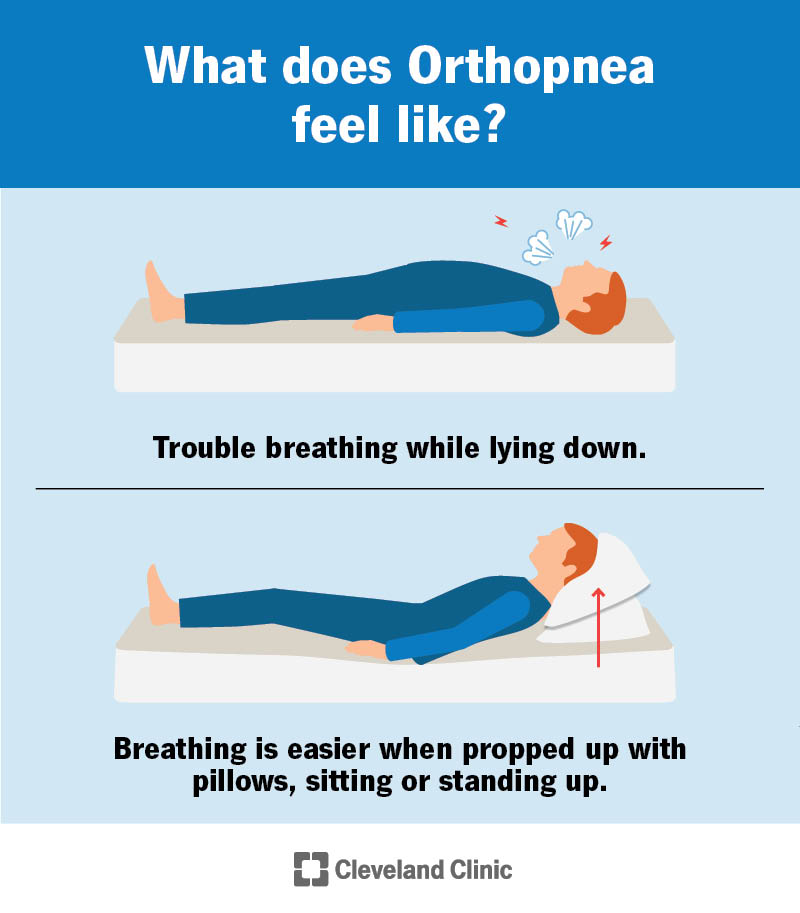Orthopnea is shortness of breath when lying down that’s relieved by standing or sitting up. Heart failure, lung disease and other medical conditions are typical causes of orthopnea. Treating the underlying condition, using oxygen, taking medication or repositioning helps.

Orthopnea (or-thaap-nee-uh) is shortness of breath (dyspnea) that happens when you’re lying on your back (in a supine position). Sitting or standing up relieves this symptom. Orthopnea can occur randomly or worsen over time. It’s almost always a sign of an underlying medication condition.
Orthopnea is different from paroxysmal nocturnal dyspnea (PND). PND occurs when shortness of breath wakes you up at night. It only occurs during sleep, whereas orthopnea can occur when you’re not sleeping. For example, it can happen when you’re lying down to watch TV or lying down for an exam at your healthcare provider’s office.
Since orthopnea is usually a sign of a more serious condition, it’s important to talk to a healthcare provider if you experience breathing difficulties.
People with orthopnea may need several pillows to prop themselves up so they aren’t lying flat. Some may sleep sitting up on a couch or chair because they find it helps them breathe better.
Advertisement
Cleveland Clinic is a non-profit academic medical center. Advertising on our site helps support our mission. We do not endorse non-Cleveland Clinic products or services. Policy
People experiencing orthopnea become short of breath or feel like they can’t get enough air when they lie on their backs. The exact feeling varies from person to person, but people describe it as having difficulty breathing or feeling like they can’t catch their breath. It improves when you sit or stand up.
You may also experience symptoms like:
An underlying medical condition is usually the cause of orthopnea. These conditions tend to cause fluid to build up around your lungs or make it hard for your lungs to expand and take in air. When you lie flat, your blood redistributes from your legs to your lungs. This puts extra pressure on your lungs, making breathing difficult. If your heart is healthy, it pumps this extra blood out. But, if your heart is weak, it isn’t strong enough to do this. That’s why when you sit up and redistribute the blood again, you find breathing is easier.
Some of the medical conditions that may cause orthopnea or put you at risk for it are:
Advertisement
Since orthopnea is typically a sign of another condition, it’s important to see a healthcare provider if you have shortness of breath while lying down.
If your healthcare provides suspects orthopnea, they’ll review your symptoms and health history to see if you have a condition that’s associated with orthopnea. They may ask you to describe how breathing feels and how many pillows you need to prop yourself up. Your provider may also order tests to look at your heart and lungs. This could include:
Advertisement
Your healthcare provider will treat the underlying condition while also helping you to take steps to minimize your symptoms. This could involve help with learning how to reposition yourself, giving you supplemental oxygen or taking medication. Some underlying conditions have treatment with surgery or a medical device like a pacemaker.
Lifestyle changes like managing your weight or using an adjustable mattress or foam wedge to prop yourself up may be beneficial.
Some of the common conditions and their treatments include:
The only way to prevent orthopnea is to reduce your risk of the conditions that commonly cause it. Living a healthy lifestyle is the best way to do this. Some examples of how you can try to avoid conditions that may cause orthopnea are:
It depends on what’s causing orthopnea, the severity and the treatment. With the right treatment, many people see improvement in their breathing when lying down.
No, having difficulty breathing while lying down doesn’t mean you have heart failure. Heart failure is one of the main causes of orthopnea, but only your healthcare provider can diagnose you with heart failure.
Contact your healthcare provider if you have difficulty breathing when you lie down. It may be a sign of a more serious medical condition like heart failure or pulmonary hypertension, which requires immediate attention.
Dyspnea is the medical term for shortness of breath or difficulty breathing. If you have dyspnea, you’re short of breath no matter what you’re doing or what position you’re in. Orthopnea is shortness of breath when you’re lying down. So, orthopnea can be thought of as dyspnea when you’re lying down.
A note from Cleveland Clinic
Not only can orthopnea make it hard to sleep; it can also be a sign of an underlying health condition. If you feel short of breath when you’re lying down, contact a healthcare provider. Finding and treating the condition causing orthopnea can help make it easier for you to breathe when lying down.
Last reviewed on 11/17/2023.
Learn more about the Health Library and our editorial process.
Advertisement
Cleveland Clinic is a non-profit academic medical center. Advertising on our site helps support our mission. We do not endorse non-Cleveland Clinic products or services. Policy